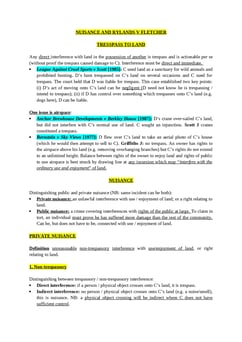Judgement for the case Ogwo v Taylor
Table Of Contents
KEY POINTS
In negligence involving the occupier's liability, the duty of care is fundamental. The duty of care extends to various parties, including firemen who respond to fires. In such situations, occupiers must exercise reasonable care to prevent foreseeable harm that may befall those attending the fire.
One common scenario involving an occupier's negligence is when the occupier's actions or omissions cause a fire. In such cases, if a fireman is injured while attending the fire, it raises questions about whether the occupier is liable for the resulting damages. This liability hinges on factors such as the occupier's knowledge of the fire risk and their actions in response to it.
Firemen attending the scene may be exposed to various hazards, including injury from steam when water is applied to the fire. The occupier's liability for damages extends to such injuries if it can be shown that they failed to take adequate precautions to protect the responders or to warn them of potential dangers.
The concept of negligence and the duty of care within the occupier's liability is pertinent when fires occur, particularly when they injure those responding to the emergency. The determination of liability in these cases depends on a careful assessment of the occupier's actions and responsibilities to ensure the safety of those attending the fire.
FACTS
The occupier of a small terraced house was using a blow lamp to remove paint from the fascia boards beneath the eaves of his house. This action led to a fire on the premises. In response, the fire brigade was called to the scene. One of the firemen, wearing breathing apparatus and protective clothing, entered the house and maneuvered through a narrow hatch into the roof space where the fire was confined. He used a hose to extinguish the fire.
Upon extinguishing the fire, the fireman discovered that he had sustained serious burn injuries from scalding steam that had penetrated his protective clothing. The injured fireman initiated a legal action against the occupier, alleging that the occupier's negligence had caused the fire and that his injuries were a direct result of this negligence.
During the initial trial, the court ruled against the fireman's claim, acknowledging that the occupier owed a duty of care to the fireman and had breached that duty. The judge determined that the fireman's injuries were not a reasonably foreseeable consequence of the occupier's breach of duty.
The Court of Appeal reached a different conclusion, asserting that the fireman's injuries were reasonably foreseeable in the circumstances. As a result, they entered judgment in favor of the injured fireman for the agreed sum of £12,902, along with interest.
The occupier subsequently filed an appeal to contest this judgment.
JUDGEMENT
The appeal was dismissed. No established principle barred professional firemen from seeking damages from an individual whose negligent actions had ignited a fire, resulting in injuries sustained while combating the fire. Whether the fire was categorized as ordinary or exceptional, a fire out of control was inherently hazardous, even for individuals possessing specialized skills, training, and equipment.
It was evident that, regardless of whether the nature and severity of the injuries were foreseeable, the occupier should have reasonably anticipated a genuine risk of a fire outbreak when using a blow lamp on the wooden rafters. This, in turn, would lead to the summoning of firemen who might need to access the confined roof space, exposing them to the inherent risks of injury in such a situation, including scalding injuries.
With a clear duty of care on the part of the occupier and no break in the chain of causation, it was established that the occupier was indeed liable to the fireman for the injuries he had sustained.
COMMENTARY
This case focuses on the occupier's liability and negligence, emphasizing the vital duty of care that occupiers owe to individuals, including firemen, responding to emergencies. The occupier must exercise reasonable care to prevent harm in such situations.
In this instance, the occupier's actions caused a fire, injuring a fireman. The legal question was whether the occupier was liable for the damages. Initially, the court ruled against the fireman, deeming the injuries unforeseeable consequences of the occupier's breach of duty. However, the Court of Appeal disagreed, asserting that the injuries were foreseeable due to the inherent risks of firefighting.
The Court of Appeal stressed that professional firemen can seek damages when injured during fire incidents caused by someone else's negligence. This case underscores the duty of care in occupier's liability cases, ensuring that occupiers take precautions to prevent harm in emergencies. It establishes a precedent protecting responders' rights to seek compensation for injuries caused by others' negligence.
ORIGINAL ANALYSIS
Defendant, who was using a blow lamp to strip paint, negligently set fire to his house. Plaintiff, a fireman attending the blaze, was seriously injured.
HL held that Plaintiff could claim damages and no defence of volenti is available against firemen.
Also there was no distinction in the ordinary or extraordinary risks of fire-fighting, and violenti was not available as a defence against firemen in either of them.
For Further Study on Ogwo v Taylor
Need instant answers? Our AI exam tutor is here to help.
Ask questions 🙋 Get answers 📔 It's simple 👁️👄👁️
Our AI is educated by the highest scoring students across all subjects and schools. Join hundreds of your peers today.
Get StartedSimilar Cases
Related Product Samples
These product samples contain the same concepts we cover in this case.
| Tort Law | Occupier's Liability Notes (27 pages) |

